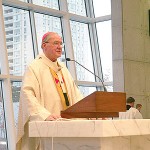There’s a story told of a small farming community that was having a rough time dealing with a long drought. At the Sunday service the pastor announced that that afternoon at 3 o’clock he would be holding a prayer service to ask God for rain, lots of rain. At 3 o’clock the little church was full, standing room only. The pastor went into the pulpit and asked the congregation, ‘how many of you brought umbrellas’? Nobody did. The service never began.
God knows we don’t need more rain at this time, we had more than enough. Sowing crops has been held up because farmers can’t get their equipment into the water logged fields.
Farming has always been a precarious occupation. No matter how mechanized it has become it is always at the mercy of the weather. Drought, winds, an early or late frost, insects, all these things can wipe out a farmer’s crops.
Israel had it fertile plains but in the mountainous region of Galilee farming was especially precarious. Rocky soil made it difficult for seeds to take root.
Though Jesus was a carpenter he knew how hard the life of farmers could be.
In today’s parable he uses the example of the farmer at seeding time. The farmer just flings a hand full of seeds into the air and the wind carries the seed to different destinations – some fell on paths where they were visible to the birds that quickly ate them. Some fell on rocky soil where they could not take root and couldn’t survive the heat of the sun. Other seeds fell among stronger weeds that chocked their growth. Most of the seeds fell on good soil and with the help of sunshine and rain produced a harvest.
Jesus talks about a harvest as high as a hundred fold. His listeners would know he was exaggerating. His listeners knew that at best a harvest of tenfold was an outside possibility.
Jesus tells us this parable to teach us how generous, how lavish God is as he pictures God flinging with abandon the seeds of his love and mercy on us all.
Then Jesus proceeds to spell out an allegorical interpretation of his parable, that names what blocks full growth of the word; gross heart and ears and eyes that spiritually deaf and blind. Men and women uninterested or failing to understand the gifts sown in their hearts; people shallow in their response to God’s gift and therefore wilting in the face of persecution, and those people being distracted by worldly anxiety and desire for riches.
Listening to this gospel we are asked to reflect on how receptive we are to the love and mercy and blessings of God. It is a question only we can answer. What kind of a harvest do we provide?
 Founded by St. Paul of the Cross, every Passionist takes a special vow to spend his or her energies in promoting remembrance of the sufferings of Jesus, the memory of the Cross, and reflection of the meaning of the Cross for the world.
Founded by St. Paul of the Cross, every Passionist takes a special vow to spend his or her energies in promoting remembrance of the sufferings of Jesus, the memory of the Cross, and reflection of the meaning of the Cross for the world.




